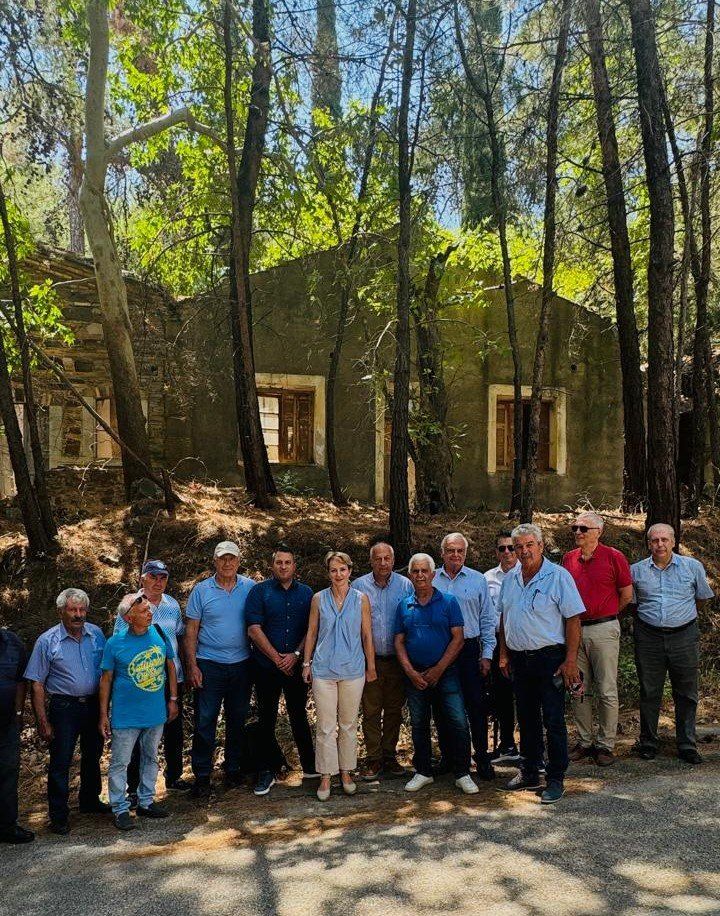On Wednesday, July 11, the Deputy Minister of Environment and Energy, Ms. Alexandra Sdoukou, visited Chios to meet with representatives of the local government, production bodies, and residents of the island to discuss the prospects for the mining development of the public mineral area of Keramos on the northern side of Chios.
Accompanied by the Secretary General for Energy and Mineral Resources, Mr. Aristotelis Aivaliotis, and senior officials from the Ministry and the Hellenic Survey of Geology and Mineral Exploration (EAGME), the Deputy Minister held an informative meeting with the Mayor of Chios, Mr. Giannis Malafis, and later carried out an on-site inspection at the former antimony mines in Keramos.
During the morning meeting at the Town Hall, Ms. Sdoukou discussed ways to support the municipality’s efforts toward the island’s energy transition to renewable energy sources, outlining the necessary actions from both the local authorities and the Ministry of Environment and Energy to move forward.
Subsequently, Ms. Sdoukou and the Ministry’s delegation visited northern Chios to tour the old mining facilities, explore existing tunnels, and inspect the former loading station in the coastal settlement of Agiasmata, the historic port of Keramos.
In an open discussion later that afternoon at the Homerion Cultural Center of Chios, the Deputy Minister, the Secretary General, and officials from the Ministry and EAGME presented in detail the development potential and benefits of the proposed mining initiative, engaging in dialogue with the local community, whose strong turnout reflected the high level of public interest.
Ms. Sdoukou clarified that the Ministry has not yet reached a final decision regarding the exploitation of the site, emphasizing that it is still in the exploration phase. “Greece has significant untapped mineral resources,” she noted, adding that “Chios holds valuable antimony deposits that could position the island as a key player at the European level.” She further highlighted that “responsible resource development requires a well-structured national plan, strict environmental protection measures, and, most importantly, social consent.”
Referring to the EU strategy for energy autonomy and reducing dependence on imported raw materials, she underlined that “the potential exploitation of Chios’ antimony deposits aligns fully with Europe’s strategic objectives.”
She emphasized the importance of public dialogue: “Our goal is to inform local citizens and communities about the Ministry’s intention to responsibly develop the Chios public mining site, ensuring transparency and social acceptance. The proposal involves the Chios antimonite deposit, specifically the designated public mineral area, for which an international tender is being considered to lease a section for exploration and potential exploitation.”
Ms. Sdoukou also explained that all necessary evaluations and approvals from relevant authorities—such as the Archaeological Service, Forestry Department, Environmental and Mining Inspectorates—have already been obtained to ensure the area’s integrity. She stressed that “the Ministry will make every effort during the tendering and contractual stages to maximize benefits for both the local community and the national economy.”
Regarding the region’s mining heritage, she noted that “any future mining activity should include programs for the preservation, restoration, and promotion of these historic sites, enhancing the potential for industrial tourism.”
The Secretary General for Energy and Mineral Resources, Mr. Aristotelis Aivaliotis, emphasized the importance of sustainable and responsible mining, ensuring environmental safety and biodiversity protection. “The Ministry will not simply stop at signing a contract but will establish a continuous monitoring and accountability framework to address any emerging issues,” he said. He also highlighted the inclusion of a Corporate Social Responsibility (CSR) program in any future agreement to ensure tangible benefits for the local community.
Dr. Ioannis Zafeiratos, Head of the Directorate for Metalliferous, Energy, and Industrial Minerals at the Ministry, analyzed the expected benefits of potential development, while Mr. Alexandros Koulidis, Deputy Head of Environmental Licensing, outlined the environmental protection measures that would accompany any mining operation.
Dr. Kostas Laskaridis, Head of the Directorate of Mineral Resources and Mining at EAGME, presented the research steps and timeline to follow after the announcement of the international public tender for exploration and exploitation rights.
Finally, Mr. Christos Kavalopoulos, Director General of the Hellenic Mining Enterprises Association (SME), explained how modern mining technologies can drastically reduce operational and environmental risks, ensuring a more sustainable and safer approach to resource utilization.
At the conclusion of the event, local representatives were invited to share their questions and concerns, which were addressed in detail by officials from the Ministry of Environment and Energy.


